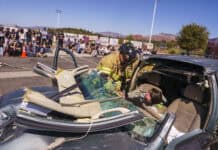Earlier this year, it appeared that we would have a relatively robust Sedona City Council election. There were two candidates for mayor and five for three seats on council. But as government shutdowns limited access to potential voters to sign petitions, two individuals — Stephen McGarry and Robin Harris — initially got packets to run in this election but won’t be running. One did not turn in enough signatures by the deadline, the second one dropped out after the deadline, yet he’ll be on the ballot.
Heading into July, the mayor’s race was still between the incumbent Sandy Moriarty and challenger Kurt Gehlbach, and council reduced to an uncontested race between Holli Ploog, Kathy Kinsella and incumbent Jessica Williamson.
However, thanks to two last-minute official write-ins — Michael Werner for mayor and Edwin Larrieu for council — there will be three candidates running for mayor and four running for three seats on the city council.
As write-in candidates, voters who choose to vote for Werner or Larrieu will need to physically write their names on the ballot when they send it in. Although they are late to the game, we applaud both of these candidates for jumping into the race at the last minute.
Without them, the race for mayor would be a two-way head-to-head between two candidates and definitively decided in the Aug. 4 primary election. A third candidate makes it mathematically possible for none of the three candidates to reach the minimum threshold of 50% plus one vote needed to win the election outright next month, prompting a runoff election in November.
Such an eventuality means residents and voters get three more months to discuss the policies, programs, goals and direction of the city and our future before choosing between the top two vote-getters in the primary election.
On the Sedona City Council side, three candidates for three seats means that a near majority of council candidates would be elected without facing the crucible of public discussion debate and scrutiny.
In an uncontested election, one candidate could wildly proclaim that the pope is secretly a reptilian alien, we should burn city hall to the ground and outsource our police to the Chinese People’s Liberation Army, yet they would still likely get elected.
If elections are not contested, then we are no different than the autocratic one-party nation-states who handpick their “candidates” before elections merely confirm them to office by party members.
If elections are not contested, then we have failed as a democracy.
We have failed to step forward, failed to nominate ourselves to represent our neighbors and community, failed to present our ideas to the public, failed to represent the political, cultural, generational and demographic diversity of our community and failed to take on the obligation of civic duty that our founders intended for the best of us.
We’ve denied voters, residents and visitors the assurance that the best people have opted to represent their interests in elected government. Instead, our city is represented not by our best and brightest, but merely the folks who managed to fill out their paperwork on time and get the absolute bare minimum amount of support to sign petitions.
The other major downside of an uncontested election is that the officials who get elected have not faced real public scrutiny on their records. The public is less likely to watch debates or attend forums or read campaign material if the election is already a done deal.
It also means that weeks or months into their term when the other shoe drops, the chips fall, the pressure builds and other such clichés are used in newspaper editorials, they may cave to other council members’ demands, or cave to the loud public voices screaming at them from the public podium or bashing them on social media, or forget that their responsibility is to the public as a whole.
Without competition to win the seat, shoe-ins tend to think they are invincible because no one “opposed” them at the outset, therefore they can do what they want without any repercussions. They are not beholden to voters because they were elected without discussion and ergo, must have the mandate of heaven to do what they please. This is the most dangerous risk to our democracy, from an uncontested election.
Elections must be contested if we are to survive as a republic. With the addition of Edwin Larrieu to re-contest the uncontested council election and Michael Werner to make the mayor’s race more competitive, we have more choice to select our best representatives.
Christopher Fox Graham
Managing Editor






















